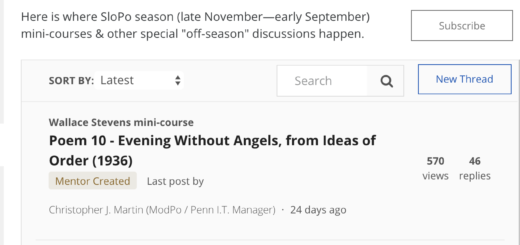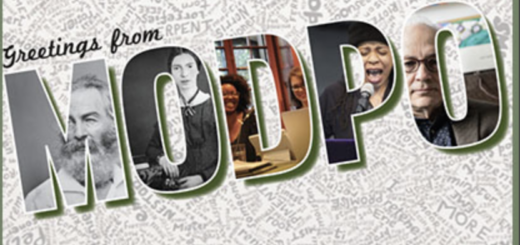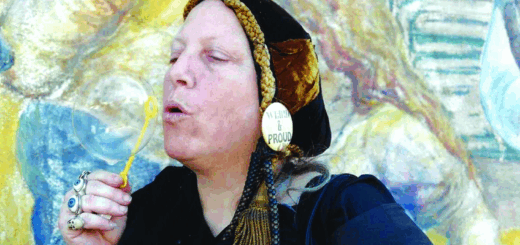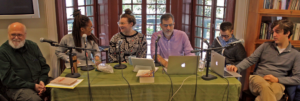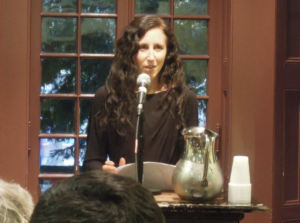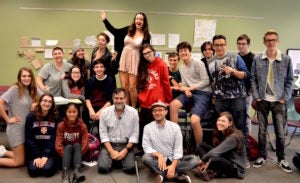Migrations into English: Indigenous, Immigrant, and Multilingual American Poetry
A SloPo class — February 8 to March 4, 2020
Join in to the extent that you have time for. Everyone is welcome to visit — go at your own pace. I’ll be holding extensive office hours online live several days a week. It will be great fun and provocative.
We will be focusing on non-European traditions and emergent poetries in or translated into English, using as a starting point Jerome Rothenberg’s anthology of American-Indian poems (mostly) in translation, SHAKING THE PUMPKIN: Traditional Poetry of the Indian North Americans, as a starting point. We will discuss Rothenberg’s concept of “ethnopoetics” and consider the quandaries of putting oral tradition and place-based performance onto the printed page.
Each poem we will read will be worth reading on its own merits. And also from some angle, will engage with the poetics of multilingualism and cultural collisions where conventional English cannot be taken for granted as neutral. The English language evokes its own history and summons questions of identity, selfhood, and voice to be played with and against in the crafting of the poem. How can we close read these poems as poems also incorporating their own invocations of context and history?
We will read contemporary various indigenous poems written primarily in English by people of descent from different tribes–Inuit, Mohawk, Kumeyaay, Navaho–from people rooted in different locations–Hawaii and Guam. We will read, listen to, and watch poetries from the post-slavery, post-colonization Caribbean, such as M. NourbeSe Philip’s “Discourse on the Logic of Language,” We will sample Kamau Brathwaite’s HISTORY OF THE VOICE and Louise Bennett-Coverley’s beloved performances of poems in Jamaican patois. We will consider poems written by African-American descendants of slaves transported by force. We will read poems written by first and second-generation immigrant poets, Asian-American, South-Asian-American, Middle-Eastern-American and Latin-American. We will consider the negotiation of identity and the ways in which these poets engage “Correct” English and Western conventions.
Please email modpo@writing.upenn.edu to express your interest and get on the course news email list, which I’ll be relying on to convey to you important course news and information.
Before February 8, please stop by the course’s dedicated area on the ModPo website and just say hello; feel free to offer any introduction to yourself and/or your thoughts about the course! Starting on February 8, that’s also where you will go to access the Week One material and find the discussion forums. The actual link to the course’s homebase is
Other poets from among whose poems we may read: Joy Harjo, Leslie Marmon Silko, Gloria Anzaldúa, dg nanouk okpik, Heriberto Yépez, Nathaniel Mackey, Fred Moten, Morgan Parker, Gwendolyn Brooks, Claude McKay, Ocean Vuong, Craig Santos Perez, Monica Youn, Arthur Sze, Tommy Pico, Myung Mi Kim, Eduardo Corral, Jericho Brown, Theresa Hak Kyung Cha, Douglas Kearney, Franny Choi, Sawaka Nakyasu, James Thomas Stevens, Safia Sinclair, Anne Tardos, Mark Nowak, Layli Long Soldier, Zeina Hashem, Natalie Scenters-Zapico, Mahealani Perez-Wendt, Li-Young Li, Brandy Nālani McDougall, Dan Taulapapa McMullin, Divya Victor, and Lillian Allen.
You will have the entirely optional chance to write a poem in a poetic form, the ghazal, popularized in the United States and written in English by the Kashmiri immigrant poet Agha Shahid Ali — a poetic form that has challenges and invokes questions of voice. The ghazal is not from the British and American traditions but is a form that developed in Arabic and Persian with its own strict rules that one might find disorienting or not, ours to freely adopt, or adapt to, or with it hybridize.
We will be meta-poetically aware of a poem as an active site of resistance and emergence. We will pay attention to how a poem enacts, performs, struggles and negotiates with the ever-ongoing flux of such concepts as voice and self, identity and language.
Again, please email modpo@writing.upenn.edu to express your interest and get on the course news email list.
Please email me at jasonzuzga@gmail.com with any questions or concerns!

